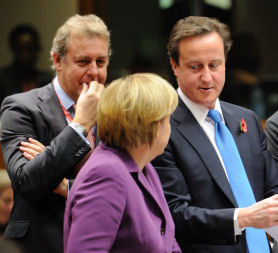Cameron claims ‘victory’ in EU budget
The Prime Minister has claimed victory in his bid to limit next year’s EU budget rise to 2.9 per cent, despite previously saying he wanted to cut or freeze the budget. Cathy Newman is in Brussels.
David Cameron told a press conference at the close of the EU Summit that Britain had “made a real difference” in capping the budget rise to 2.9 per cent from almost six per cent.
“We were looking down the barrel of a potential six per cent increase and through negotiations we have pegged that back to 2.9 per cent,” Mr Cameron said.
He said he had signed up 12 other heads of government to reject a proposal for the budget to rise by 5.9 per cent. The increase of 2.9 per cent will still cost UK taxpayers roughly £435 million.
“We were looking down the barrel of a potential six per cent increase and through negotiations we have pegged that back to 2.9 per cent.” Prime Minister David Cameron
The 12 EU member states who had “given their word” include Italy, France, Germany, Denmark, Sweden and the Netherlands.
“The 2011 budget was not on the agenda for this Council. We put it on the agenda,” Mr Cameron said.
“At this meeting we’ve taken the first vital steps. There is a long way to go, but we have started a process and we will stick at it.
“We’ve made sure the EU budget must reflect domestic spending cuts, and we’ve protected the UK taxpayer from having to bail out EU countries that get themselves into trouble,” he said.
Downing Street described the move as unprecedented and “an important first step towards ensuring that the EU gets a grip on its finances for the future”.
But Labour’s shadow Foreign Secretary Yvette Cooper said the 2.9% increase had already been agreed by European ministers in August.
Cameron on EU budget: "We stopped that juggernaut"Political Correspondent Cathy Newman describes David Cameron's "achievement of sorts" at the EU Summit.
"We have succeeded quite spectacularly. I hit the phones yesterday before coming to the summit and stopped that (budget) juggernaut in its tracks."
David Cameron, prime minister, Brussels summit October 29, 2010
David Cameron was modest enough to admit he hadn't found El Dorado here in Brussels. But he did claim he'd succeeded "quite spectacularly" in persuading 12 other European countries to reject an increase in the EU budget of nearly 6 per cent - backing a 2.9 per cent rise instead.
From where his eurosceptic backbenchers are sitting though that looks rather more like failure than success.
Read more on Channel 4 News FactCheck on the EU budget: how successful was David Cameron?

The EU Leaders’ Summit in Brussels also agreed to look at a new set of rules which are aimed at averting another financial crisis across the Eurozone.
Officials are proposing a permanent fund to replace the temporary one, worth 440bn euros, set up earlier this year to bail out Greece, there to underpin the value of the euro.
Mr Cameron told Channel 4’s Cathy Newman there should be no need for a referendum on the changes because there are no plans to “transfer powers from Westminster to Brussels.”
“These should be changes that don’t affect the UK. Remember we’re not in the Euro, we’re not going to join the Euro, we’re not subject to any of the penalties being discussed here.
“So I think it is perfectly plausible to say that it isn’t going to make any difference to us.
He said in light of the deep spending cuts outlined in the Spending Review, the “main priority for the British people is that we stop sending money to Brussels.”
There are also proposals for new legislation that will allow the EU to check the budgets of its members countries.
Germany has argued that to enact the new rules – which would allow EU officials to warn individual governments about issues such as property bubbles and fine those stepping out of line by overborrowing and overspending – the Lisbon Treaty will have to be amended.
A prospect that, given the decade it took to originally negotiate and the chaos over the referendums to ratify it in Ireland, is not a prospect many Eurocrats relish.
But the importance of the new rules is underscored by officials in Brussels admitting that the eurozone had almost collapsed earlier this year because no such legislation existed.
-
Latest news
-
‘I violated my moral compass working for Trump,’ former lawyer testifies3m

-
Working class creatives in film and TV at lowest level in decade5m

-
Israeli police investigating attack on Gaza aid convoy4m

-
Biden announces major tariff increase on Chinese-imported green tech3m

-
‘If NHS can afford it, people with obesity should have Semaglutide,’ says weight loss expert5m

-




